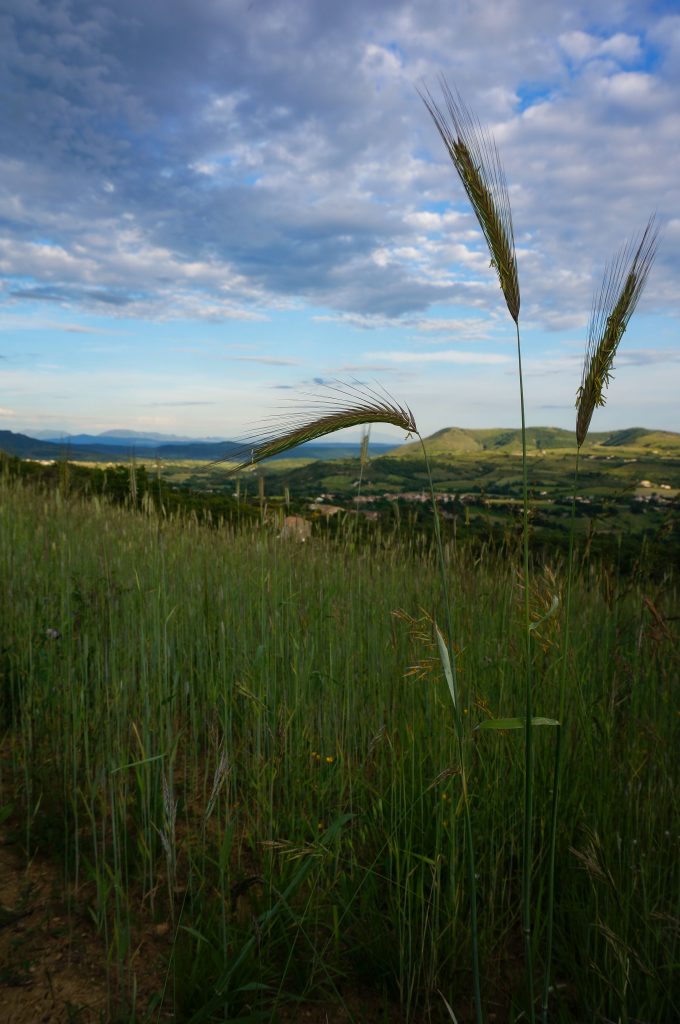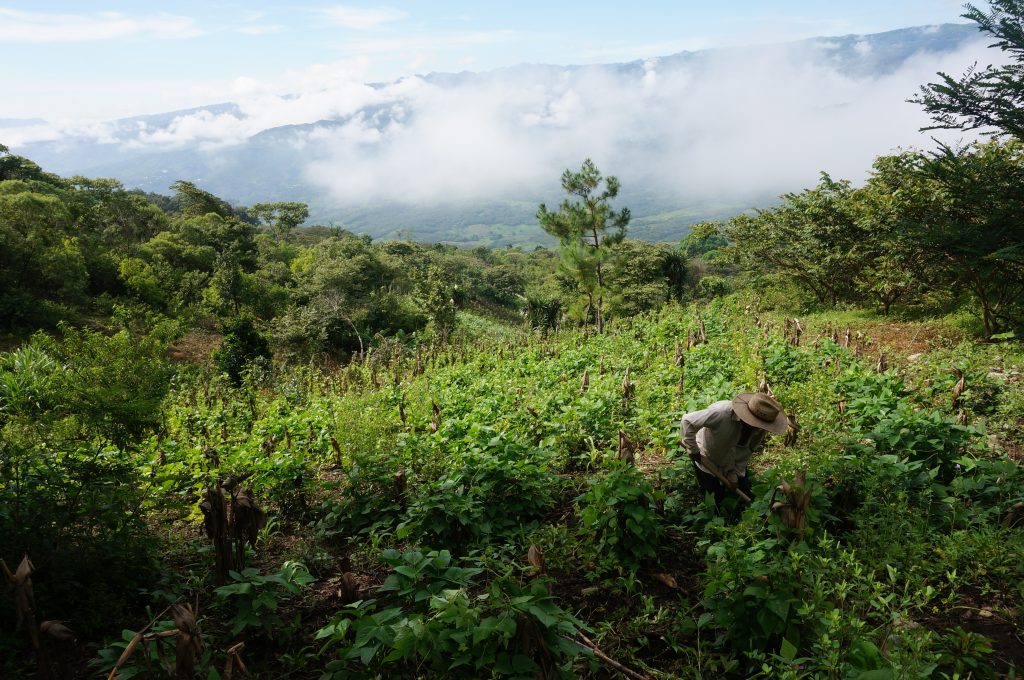
Morgan Jenatton is a PhD student in the Departamento de Agricultura, Sociedad y Ambiente, El Colegia de la Frontera Sur and the Centre Norbert Elias at L’École des hautes études en sciences sociales (EHESS) in Marseille, France. Morgan’s work covers agroecology, political ecology, sociology, and anthropology. In this interview with Alanna K. Higgins, they discuss the use of a political ecology framework, dishes that bring you “back,” Mexican tortilla, French bread, and publishing/working in languages other than English. Morgan can be found on Twitter at @momojena and ResearchGate.
How did you come to be a member of ASFS? What do you think membership brings to your work as a PhD student?
Fresh off the block! I joined after the joint conference in June. I am pretty wrapped up in French and Mexican academic communities, and academically closest to sociology/anthropology and agroecology. I had been thinking for a while of trying to engage with a more international crowd, but also intellectually with this broad field of food studies. Membership in ASFS lets me tune in to the conversations and ideas in these spaces, which don’t always cross the Atlantic or southern border. The discussions and approaches really are quite distinct, and I am thrilled to be able to enrichen my own reflections through the dialogue that membership provides. Looking forward to next year’s conference!
Your doctoral project examines Mexican tortillas and French bread alongside transitions and changes around them. What drew you to this topic?
I can pin it down pretty precisely. I did my master’s fieldwork in Chiapas, southern Mexico, on a corn-based drink that is made from essentially the same dough (masa) as for tortillas. I worked primarily with schools, but I spent a lot of time in the homes of local families in the mountain communities, and just kind of naturally fell into the rhythm of making tortillas with the women every morning. I think part of it is that I worked as a professional cook for many years before going to grad school and I instinctively wanted to cook with and learn from the women I was spending time with. So I spent a lot of time making tortillas, and laughing and gossiping and reflecting on life and love and heartbreak and answering questions about France and my life in other countries. And a question that always came up was, “What are the tortillas like in France?” and I had to break the news that we don’t have tortillas, but we do have bread. And that we don’t really eat corn, but we do have a lot of wheat. So the comparison came quite naturally, thinking about the importance and incredible symbolic weight of these foods in the two countries.
And back in the big city, my Master’s advisor, Helda Morales, started pointing out to me the number of new tortillerías (tortilla shops) that had started popping up recently, selling handmade tortillas of diverse corn “colors,” whereas for years and years the only commercial tortillas available were industrial ones made from dehydrated Maseca-type flour in highly mechanized shops. So there was an interesting question just sitting there, of what was going on, where did these shops come from, who were the women working in them, where is the corn from, etc.? And again, the comparison with bread is fairly intuitive: like the Maseca tortilla in Mexico, French bread production became highly industrialized and mechanized post-WWII. The somewhat canonic image of French bread – and even France itself! – is that of the baguette, but it is really a fairly recent urban creation and the product of an intense industrialization of French baking and agriculture. Like the artisanal tortilla in the city in Chiapas, there is a strong push towards less-industrialized breads across France, with different techniques and tools and wheat varieties contributing to a transformation of bread making.
My PhD project compares the two, looking at new forms of these foods that certain people consider to be more wholesome, agroecological, or authentic but that are not seen as such by everyone and furthermore are not always available in an inclusive manner. So I also look at social inequalities in the access to agroecological products and evaluate how knowledge is built around food as a form of emancipatory practice.

Tortilla making in the mountains of Chiapas.
Can you describe your presentation at the 2021 joint Just Food Conference, titled “Pedagogies of ordinary foods: Mexican tortillas and French bread in the construction of more just agroecological transitions?”
I presented preliminary questions and results from workshops that I am undertaking in schools and community centers in Mexico and France, in a participatory research action approach. With local partners – teachers and community center coordinators – we developed an adaptive participatory methodology aimed at accompanying the co-construction of knowledge and visions between actors concerning the ecologization of food practices, with bread and corn foods as the basis of discussion. The goal was to develop new pedagogical approaches to classic food education frameworks that are aimed more at “filling knowledge gaps,” but also to analyze the diverse learning processes at play in the move towards “sustainable food.” This methodology seeks to accompany participants not only in the conception of ways to promote an agroecological transition, but also to build their own analysis of the social justice issues associated with such a transition and ways to address them.
I think the main takeaway is the importance of creating and nurturing relationships in a participatory approach, but also more broadly the role that emotional ties play in the construction of a more sustainable future. I argue that changes in practices often take place in relationships of trust and affinity, so our goal is to create a setting where emotional ties can open up possibilities for other types of discussions and ideas, leading to the identification of logistical or financial obstacles in accessing agroecological foods and to a collective reflection on the forms of coordination that can contribute to overcoming these obstacles.

A local farmer-baker’s rye field in Ardèche, where I do my bread fieldwork.
You have a forthcoming publication titled “Emergence and consolidation of a ‘Latin American’ political ecology: contributions to the analysis of the agroecological transition of food systems.” Could you tell us about political ecology and what it brings to the study of food?
It is important to start off by noting that political ecology can refer to a few different things, depending on the linguistic community and epistemological references. In France écologie politique is a very broad term that refers to the militant action of “defense of the environment,” the institutional politicization of environmental issues (though Green parties, etc), or their theorization in academic and philosophical spheres, usually with a critical theory (neo-Marxist) base. When we talk about political ecology in English, we are generally talking about an academic literature that emerged in the 70s and 80s again primarily within a Marxist framework and that sought to highlight the political nature of environmental degradation, to argue against the notion that this degradation is just a natural result of Malthusian population growth. Political ecology was primarily developed by geographers working in the Global South and closely tied to political economy, that is, trying to tie localized “Third World” environmental problems to more macro socio-economic conditions. It has become a very diverse and widely used theoretical framework for an array of empirical subjects, and Moragues-Faus and Marsden (2017) for example have done a thorough review of its applicability to food scholarship.
“Latin American political ecology” is a theoretical framework that branched off from this anglophone literature in the 90s and 2000s, initially carried by authors like Arturo Escobar, Enrique Leff, and Joan Martinez Alier. It has asserted its own influences and objects of study, drawing on elements shared with broader paradigms in the social sciences – such as post-structuralism and the ontological turn – but also on its own epistemological references – notably Latin American critical thought, decolonial studies,and various key concepts developed from this specific Southern region, as well as a perhaps unparalleled partnership between academic and activist circles. In my article I present this literature to a French academic audience and develop a proposed application to the empirical analysis of food systems. The main thrust of this proposal is that we can look at food through three angles informed by this activist ecología política : 1) a relational and ontological understanding of power, and how actors undertake their liberation from oppressive structures in food systems; 2) the learning processes and pedagogical tools leading to the construction of emancipatory projects for more sustainable food; 3) and from a conception of nature that centers emotional bonds, evaluate the ways in which actors establish these bonds with the territory, and through them build their emancipatory projects and their visions of a more just and sustainable future of food.

A workshop in France, with local bakers and families coming together to make and break bread.
Most of your work is published in French and Spanish – do you have advice for PhD students who want to publish academically in a language other than English?
Ah, I have the very unfair advantage of coming from a French-speaking family… And once you’re bilingual, it’s easier to add on another language, particularly in the extended Latin family. Also, the course of my life has brought me to French and Mexican schools for my Masters and PhD, meaning I am pretty much immersed in these linguistic communities.
So I don’t want to be preachy. But I do think it is important to publish in the language of the areas where you do fieldwork. If you are using people to build an empiric base for academic knowledge production and to advance your own career, it just seems necessary to share your analysis and “results” with those same people. I think we are so used to the extractive nature of academia, it is so totally normalized to use “the other” as a source of knowledge production, that we can lose track of the fact that those who benefit most directly and most dramatically from these exchanges are us. And it’s not even close.
So sharing our analysis and writings is the most rudimentary way of trying to counteract that process, of returning a bit of epistemic mining back where it came from.
But it’s not easy. It is a ton of effort and energy to publish in different languages (even though non-English speakers do it all the time…), and to try to not repeat yourself, to have texts that are pertinent for where you are publishing, etc. Not everyone has the time and resources to dedicate to that. So I’m not sure I have any helpful advice other than to be conscious of your relationship with your fieldwork communities and do your best.
As we know, English is the “lingua franca” of academia – in your experience, is this something that enough academics are aware of? What barriers do you think this causes, especially for students and early career researchers?
I think French- and Spanish-speaking academics are certainly aware of it! I couldn’t say to what extent folks in anglophone academic spaces are… But I think it’s important to articulate and situate the inherent structural advantages that come from being able to navigate fluently in English, which is my case. English is the “lingua franca” but also a powerful prestige language and to be “taken seriously” in academia, you have to publish in English. This gives a heavy advantage to native speakers and narrows to just to a thin slice of the world the type of knowledge that is valued and heard.
Clearly, an important criterion for success in French- and Spanish-speaking academia is ease with English, which is directly linked to class and educational advantages, and effectively acts as a filter as to who has access to academic spaces. For example, at my Mexican school, ECOSUR, a tested level of English proficiency is a requirement for admission to the master’s and PhD programs, whereas proficiency in an Indigenous language – such as one of the many spoken in the surrounding region – is not a part of admission criteria. This establishes quite a real barrier as to who enters these programs and ultimately, what voices are heard and what types of knowledge are produced.
I’m not sure as native speakers how we can better fight against these imbalances, but I certainly think publishing in the language of your fieldwork – sharing the knowledge we are producing and extracting within its own linguistic community – is the bare minimum.

A farmer tends his milpa (corn field) in the mountains of Chiapas, where I do my tortilla fieldwork.
Has your background working as a chef in restaurants that utilize products from small-scale producers influenced your research trajectory?
Absolutely. But I would say more that they go hand in hand. When I worked as a cook (I prefer cook to “chef”), I actively sought out restaurants that were aligned with what I saw as sustainable, thoughtful and regionally adapted food. But this work – especially in the incredible restaurants I had the good fortune to spend time in – also focused my gaze to the nitty-gritty labor of food transformation and when I made the shift to academia, certainly shaped the research topics I pursued. I think today these experiences give me a depth of analysis, or a particular perspective, that is maybe not shared by those who have pursued a more linear path. But we’re all different, it’s important to have a complementarity. My experience has certainly shaped how I approach my fieldwork, where I orient my research lens, and that has been my particular path.
Having lived in the United States, France, and Mexico, do you have a dish or dishes which bring you back to each place?
Oh man, so many. But actually, I think that the dishes that most “bring me back” are ones that are totally unavailable elsewhere, so when I eat them I am quite literally already back. I think from Mexico, nothing transports me like a tamale. I don’t like super meaty tamales, just simple bean or chipilín (leafy vegetable) tamales, or sweet corn tamales, de elote. And Yucateca food makes me weak. Pibil. Salbutes. Oh lord, salbutes. Also, just a totally straightforward, national dish, chilaquiles rock my world.
In France, not to be predictable, but bread. Really good bread can be so hard to find abroad, and pretty much impossible in Chiapas (lo siento, amigues!). Bread and cheese. Bread and cheese and red wine. Hold on, I’m drooling on my keyboard.
From the States, I’ve got to say I miss pies. Pumpkin pie! It has been years since I’ve had pumpkin pie (I could make pumpkin pie, why don’t I do that more often?). Pecan pie! Pecans are super expensive and usually gross abroad, after having lived in Texas with wild pecans just dropping on the sidewalk I don’t even bother with pecans in France. Cherry pie! Just pie, man. How do I survive without pie? And Thanksgiving foods. I miss Thanksgiving. Collard greens. This question is horrible.
